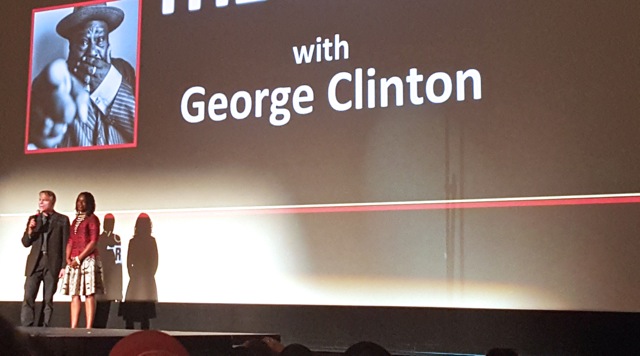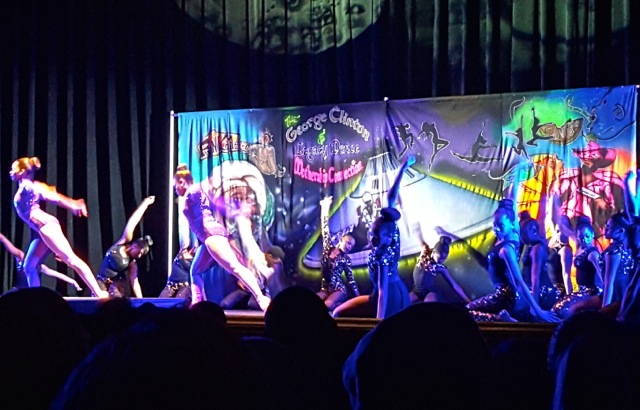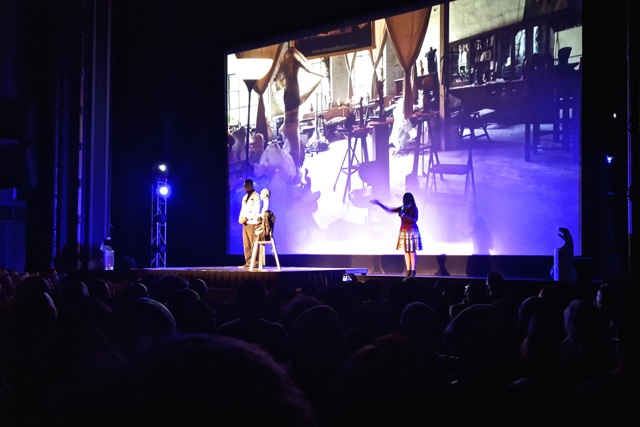
Funkmeister George Clinton headlines Twisted Storytellers event in Detroit

George Clinton was the headliner, drawing a capacity crowd to the 1,100-seat Detroit Film Theatre auditorium.
The Secret Society of Twisted Storytellers is an organization that seeks to promote connectivity, understanding and humanity through the sharing of honest personal stories–a mission that is supported in part by a $30,000 Knight Arts Challenge grant. The society achieved a triumphant actualization of its goals on Nov. 5, packing the Detroit Film Theatre for a mainstage event starring musician and inspirational figure George Clinton.
Clinton was the obvious draw for the diverse crowd, but the entire bill was an inspiring cross-section of Metro Detroiters. A greatest hits medley by Clinton’s musical collective, P-Funk, was performed alongside dozens of young students from Legacy Dance Studio. This led into a series of stories, including a hilarious reflection on the indignities of the Macy’s interview process from Twisted Storytellers Executive Director Satori Shakoor. All in all, the evening was a celebration of Detroit at its most sincere and human. The pride and excitement in the room were palpable, and the event marks a triumph for Twisted Storytellers, as well as the Detroit Film Theatre.
I followed up with Shakoor to get the final word on the night’s festivities. One thing you can count on from a master storyteller: she really knows how to lay it all out for you.
What inspired you to seek out George Clinton as a storyteller? George Clinton’s music has spanned six decades. P-Funk performs on all six livable continents. The message in the lyrics is uplifting, thought-provoking and inclusive, [all] characteristics that reflect our mission as an organization. If anyone would bring a diverse audience, it would be George Clinton. I had the opportunity, the privilege and great fortune to have been part of the P-Funk legacy. I was inspired on a daily basis for seven years (1978-1985) by the music and the wisdom of George Clinton. I was compelled and committed to bring him here. We’ve been touched by P-Funk’s music. I wanted people to be moved, touched and inspired by George’s stories.

Dancers from Legacy Dance Studio opened the show to a P-Funk medley.
This event was held at the Detroit Film Theatre instead of at your usual venue, the Charles H. Wright Museum for African American History (which is also a Knight Arts grantee). How does the venue change the energy of the storytelling experience? It is a challenge to create an intimate environment in a large venue. However, I believe that the honesty and truth in the stories is what achieves intimacy, whether it’s in the [Wright Museum] venue or in the [Detroit Film Theatre]–which is nearly four times larger. Of course, we have to create an environment that supports the intimacy of these personal stories, and that is achieved technically through lighting, sound, etc. However, one doesn’t necessarily have to see the audience or vice versa. We have had non-hearing and blind audience members. We have hired an [American Sign Language] signer just to send the message that we want everyone in our audience to enjoy these stories.
Something I thought was especially remarkable about the show was that the three storytellers, taken together, presented a view of black masculinity that is not often seen or acknowledged. Was this intentional, on your part? Yes. Black males are human. Masculinity, in my view, is an oppressive idea, as is femininity. They are both behavioral roles that limit what is possible for our full self-expression as human beings. I am interested in the connection through the humanity of people, rather than the inauthentic roles we adopt to survive our oppressive environments.
What drove you to put this set of storytellers together, and is that, in and of itself, telling a story? Yes, that is indeed telling a story. Austen Brantley came to my attention through a conversation with someone who had recently seen his work. I immediately asked for Austen’s phone number. Austen was only 19, and I wanted to present a story of a young black man in Detroit who was also an artist. When I had the privilege of being awed by his work, I knew I had to have him in our event. When we worked on the craft of shaping his story into 10 minutes, I knew he had an important story to tell. His story addressed a teenager’s dilemma and answered the questions: What happens when a young person is told to be like everyone else? What happens when a young person is told he is arrogant and stupid? What happens when a young person is supported and someone invests in them? What is possible for us all if we are heard and celebrated in community? We rise, we excel and we go further. Nothing happens of any significance outside of community. So let’s bring it inside, where the inherent nature of generosity of people will lift them up.
Dwight Stackhouse was a no-brainer. He has told a few stories at The Secret Society and is always captivating, mesmerizing and moving. He is a master storyteller with a wealth of experience. I wanted the audience to experience the power of a good story told well. Dwight Stackhouse is the one to do that.

Satori Shakoor with Austen Brantly, who followed his story with a slideshow of his work and studio while live-sculpting onstage.
Who’s the next mainstage storyteller you have your eye on? I have a wish list. Quentin Tarantino, Reginald Hudlin, Morgan Freeman, Alice Walker, Sonia Sanchez, Eddie Murphy, Robert Townsend, S. Epatha Merkerson, Spike Lee, Magic Johnson, Charles Barkley, Dave Chappelle, Stephen A. Smith, James Lipton, Lily Tomlin, Whoopi Goldberg, Judith Jamison, Neil deGrasse [Tyson], Michelle Obama. Tell me when to stop…
I very much felt a sense of the power of stories to heal, forge connection, or just challenge people to think about things they otherwise might set aside. Can you talk a little about why you think stories are important? Stories, in my experience, are the most effective delivery system of information and ideas. They are a compelling form of communication. Who doesn’t remember stories they were told when they were a child? Stories are synonymous with being human and alive. No one six feet under is creating stories; we create them on a daily basis. They are important because embedded in our stories is the collective blueprint, wisdom, failures, inspiration, opportunity to learn and grow and history of humanity. We needn’t [re]invent the wheel when we can be encouraged, supported, loved and informed through a story. A true, personal story is compelling. People aren’t being preached to. They take what they need from the story. When someone shares a true, personal story they’ve heard told by someone else, they create an automatic ownership of that story when they tell it to another. Storytelling, stories and storytellers at the highest level are the possibility of transformation. Transformation is a beautiful thing, especially when it makes a difference in someone else’s life.
The Secret Society of Twisted Storytellers will go on telling tales and transforming lives with its next installment on Friday, Dec. 18, 2015, at the Charles H. Wright Museum of African American History.
Recent Content
-
Artsarticle ·
-
Artsarticle ·
-
Artsarticle ·
